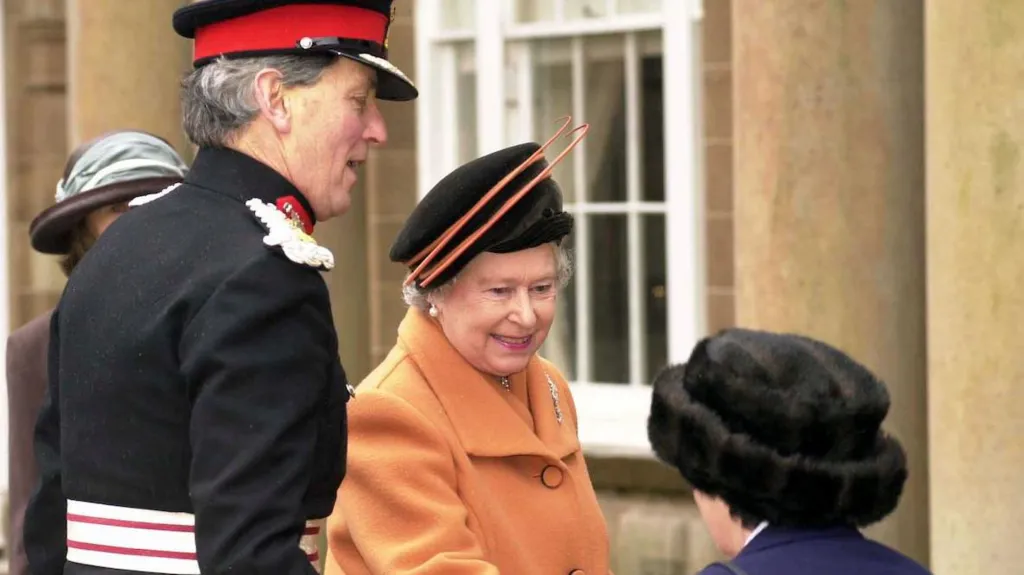NEWS
Queen Elizabeth II’s Private Insights on Northern Ireland
Queen Elizabeth II’s private thoughts on Northern Ireland and its sociopolitical issues have come to light with the release of Irish government papers. These documents, cleared for public access by the National Archives of Ireland, reveal the late monarch’s critical view of Orange marches and her hopes for peace in Northern Ireland during a turbulent period. The insights come from Ted Barrington, the then-Irish ambassador to the UK, who recorded their conversations in 2000.
At a Buckingham Palace garden party on July 25 that year, the queen expressed her relief that the annual Orange marches were quieter than expected. Barrington described her remarks as dismissive, noting her reference to the marches as “silly marching business.” The ambassador admitted this was not the first time the queen had shared such sentiments with him. Her opinions, while delivered in private, reflected her personal views on the contentious and often divisive events that marked Northern Ireland’s cultural and political landscape.

Queen Elizabeth II’s Views on Northern Ireland Revealed
The queen’s remarks were made during a private conversation, traditionally expected to remain confidential. However, Barrington chose to document the exchange, despite acknowledging the potential controversy such views could provoke. Initially, he withheld these details from his reports to the Irish Department of Foreign Affairs, fearing they might become widely circulated. Now, more than two decades later, the comments have been made public.
Beyond her remarks on the marches, the queen also discussed the peace process in Northern Ireland, expressing optimism for its success. She highlighted the importance of initiatives such as the Belfast/Good Friday Agreement, which aimed to establish lasting peace in the region. The conversation occurred during a significant week, as the agreement’s terms led to the release of paramilitary prisoners, including Michael Stone, a prominent loyalist figure. While acknowledging the gravity of Stone’s past actions, the queen emphasized that such releases were crucial for advancing the peace process.
The newly released papers also shed light on Queen Elizabeth II’s interest in visiting the Republic of Ireland. Barrington interpreted her decision to initiate the conversation as a signal of her intentions. Discussions about a state visit had begun the previous year, with Prince Charles mentioning the queen’s interest in visiting Ireland to the Ceann Comhairle (Speaker) of the Irish parliament.
Queen Elizabeth II’s Views on Northern Ireland Revealed
However, Irish officials approached the possibility of a royal visit cautiously, given the political sensitivity surrounding Northern Ireland at the time. In 1999, Ireland’s Minister of Foreign Affairs, David Andrews, stated that such a visit would be welcomed but should only occur under appropriate circumstances. By mid-2000, the Irish government deemed a visit in the following spring too soon, citing the need for further progress in political reforms, policing, and normalization in Northern Ireland. It would take more than a decade before Queen Elizabeth II made her historic state visit to Ireland in May 2011, a moment that symbolized reconciliation between the two nations.
During her 70-year reign, Queen Elizabeth II made 25 visits to Northern Ireland, the majority of which took place in the 1990s and 2000s when the peace process gained momentum. Her first visit as monarch occurred in July 1953, shortly after her coronation. On that occasion, she stayed at Hillsborough Castle, where local Orangemen marked her arrival by playing Lambeg drums, a gesture reflecting the cultural ties between the monarchy and certain segments of Northern Ireland society.
The late queen’s engagement with Northern Ireland extended beyond ceremonial visits. Her comments and actions reveal a deep interest in the region’s sociopolitical issues. The newly released documents also highlight the challenges of maintaining stability in Northern Ireland during her reign. In October 2002, devolution was suspended following police raids on Sinn Féin’s offices at Stormont. High-profile arrests and the discovery of sensitive materials heightened tensions, leading to the suspension of the Northern Ireland Assembly. It remained dormant until May 2007, underscoring the difficulties of implementing the peace agreement in a divided society.
Queen Elizabeth II’s Views on Northern Ireland Revealed
Another aspect of the documents concerns the Bloody Sunday Inquiry, chaired by Lord Saville, which investigated the events of January 30, 1972, when British soldiers killed 13 unarmed civil rights protesters in Derry. Irish government officials were critical of the inquiry’s approach, accusing Lord Saville of treating British military and political witnesses with undue deference. They feared this bias would disappoint the families of those killed. However, these concerns were alleviated when the inquiry’s final report, published in 2010, found that the soldiers’ actions were unjustifiable. The report led to a formal apology from then-Prime Minister David Cameron, a significant moment in acknowledging the injustices of the past.
Queen Elizabeth II’s remarks and actions, as revealed in these documents, offer a rare glimpse into her personal views and her role in shaping the political landscape of Northern Ireland. While she was known for her measured public statements, her private conversations reflected a more candid perspective. Her critical view of the Orange marches and her optimism for the peace process underscore her engagement with the complexities of the region’s history.
The release of these documents adds to the understanding of the late queen’s legacy, particularly her contributions to fostering reconciliation in Northern Ireland. Her reign was marked by significant political and social changes, and her willingness to confront sensitive issues highlights her commitment to peace and unity. As the world reflects on her 70 years as monarch, these insights provide a deeper appreciation of her influence in navigating one of the most challenging chapters of modern British and Irish history.